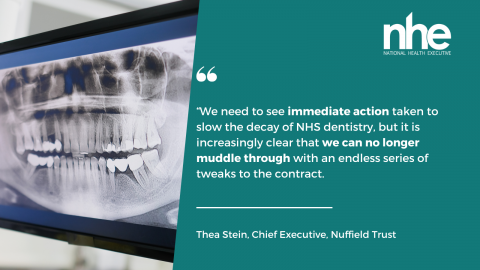Universal NHS dentistry has most likely “gone for good” unless radical action is taken to prevent further decline, experts have warned.
According to new analysis published by the Nuffield Trust, the health service’s dentistry sector is at its most perilous point in its entire 75-year history.
The think tank says the downward spiral can be put down to the effects of the pandemic, austerity and the cost of living crisis.
Issues highlighted include:
- NHS dentists delivering six million fewer treatment courses last year compared to before the pandemic
- Funding in 2021/22 being £500m less in real terms than in 2014/15
- Widespread access problems, especially for those from Black and Asian ethnic groups
Covid-19 also contributed to a “drift” towards the private sector – i.e., dentists scale back their NHS commitments and carry out fewer treatments.

The Nuffield Trust believes that, in the short-term, action must be taken to put NHS dentistry on surer footing.
This includes increasing intervals between check-ups, recruiting dental therapists from the private sector, helping local commissioners provide mobile clinics and targeted work in schools and care homes, plus investing in preventative care for children and young people.
In the long-term, the think tank suggests changing the current model to a fee-for-service payment system for low-volume, high-cost and complex procedures, combined with a needs-based approach like general practice.
Keeping more dentists in the NHS through student loans forgiveness and investment in public health are also mentioned.
Finally, the Nuffield Trust proposes that either the NHS dentistry offer is expanded with the backing of a significant portion of funding (which the authors note as unrealistic), or scaling it back to a minimum.
This could mean universal access to emergency care, pain relief and check-ups, but the more extensive services ringfenced for older patients and children.
Lead author of the Nuffield Trust’s report, Wilf Williams, said: “This report illustrates that continued neglect of dental policy is not a viable strategy. The result is a widening gulf between the Government’s stated aim that everyone who needs one should be able to access an NHS dentist and the dire reality of elusive and increasingly unaffordable care.
“For the wider health system, the lessons are troubling: without political honesty and a clear strategy, the same long-term slide from aspiration to reality could happen in other areas of primary care too.”
The think tank’s chief executive, Thea Stein, added: “Difficult and frankly unpalatable policy choices will need to be made, including how far the NHS aspires to offer a comprehensive and universal service, given that it does not do so at present.
“If, as seems, that the original model of NHS dentistry is gone for good, then surely the imperative is to provide enough access for a basic core service for those most in need.”
She concluded: “Whichever way we go, I’m afraid that NHS dentistry cannot continue without some kind of evaluation of the offer even if there are some major improvements to the way services are contracted and commissioned.”
Image credit: iStock



















